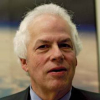Stanley B. Prusiner

Stanley B. Prusiner
Stanley Benjamin Prusiner M.Dis an American neurologist and biochemist. Currently the director of the Institute for Neurodegenerative Diseases at University of California, San Francisco. Prusiner discovered prions, a class of infectious self-reproducing pathogens primarily or solely composed of protein. He received the Albert Lasker Award for Basic Medical Research in 1994 and the Nobel Prize in Physiology or Medicine in 1997 for his prion research...
NationalityAmerican
ProfessionScientist
Date of Birth28 May 1942
CountryUnited States of America
Stanley B. Prusiner quotes about
While it is quite reasonable for scientists to be skeptical of new ideas that do not fit within the accepted realm of scientific knowledge, the best science often emerges from situations where results carefully obtained do not fit within the accepted paradigms.
It is crucial for scientists to be willing to be wrong; otherwise, you might not do the most important experiments, or you may ignore your most important findings.
During the summer of 1963 between my junior and senior years, I began a research project on hypothermia in the Department of Surgery with Sidney Wolfson. I quickly became fascinated by the project and continued working on it throughout my senior year.
My three years at the NIH were critical in my scientific education. I learned an immense amount about the research process: developing assays, purifying macromolecules, documenting a discovery by many approaches, and writing clear manuscripts describing what is known and what remains to be investigated.
People often ask me why I persisted in doing research on a subject that was so controversial. I frequently respond by telling them that only a few scientists are granted the great fortune to pursue topics that are so new and different that only a small number of people can grasp the meaning of such discoveries initially.
From the point of view of many scientists, gods represent an explanation for the unknown. Scientists are focused on trying to understand the unknown, so there is a fundamental conflict. That said, some scientists find religion useful and perhaps even fulfilling.
I believe that politics takes a much different set of skills than science. Science is about getting to the truth. Politics is about what people think and how they react.
Concepts are vindicated by the constant accrual of data and independent verification of data. No prize, not even a Nobel Prize, can make something true that is not true.
Being a scientist is a special privilege: for it brings the opportunity to be creative, the passionate quest for answers to natures most precious secrets, and the warm friendships of many valued colleagues.
In science, each new result, sometimes quite surprising, heralds a step forward and allows one to discard some hypotheses, even though one or two of these might have been highly favored.
Our goal is to figure out a therapy for prion diseases.
The Nobel Prizes are much more than awards to scholars; they are a celebration of civilization, of mankind, and of what makes humans unique - that is their intellect from which springs creativity.
Besides numerous science courses, I had the opportunity to study philosophy, the history of architecture, economics, and Russian history in courses taught by extraordinarily knowledgeable professors.
Neuroscience is by far the most exciting branch of science because the brain is the most fascinating object in the universe. Every human brain is different - the brain makes each human unique and defines who he or she is.